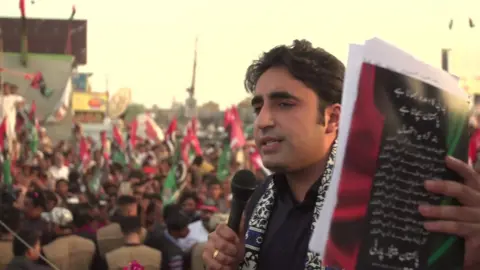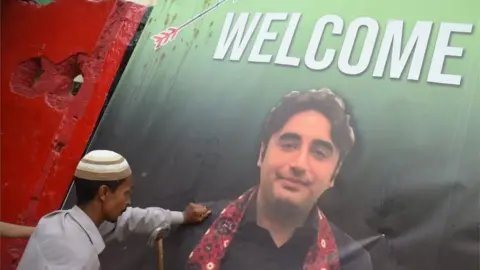Pakistan election: Bhutto outlines 'peaceful, progressive' vision
 BBC
BBCThe son of assassinated former Pakistani PM Benazir Bhutto has told the BBC he is campaigning to implement her vision of a "peaceful, progressive, prosperous, democratic Pakistan".
Bilawal Bhutto Zardari, the chairman of the Pakistan People's Party (PPP), is standing for parliament for the first time in the 25 July general election.
Ms Bhutto was killed by a suicide bomber at a rally in 2007.
Levels of support for the party have dropped in recent years, analysts say.
Mr Bhutto Zardari, 29, was appointed as joint leader of the PPP shortly after his mother's death, alongside his father Asif Ali Zardari.
He is the third generation of his family to enter politics, his grandfather Zulfiqar Ali Bhutto having served as prime minister in the 1970s before he was executed by military dictator General Ziaul Haq.
Despite his family's turbulent political history, Mr Bhutto Zardari told the BBC he was not afraid of taking a leading political position and that his manifesto was the basis of "an egalitarian Pakistan… where we look for the benefit of the many, not just the few".
Polls currently predict, however, that the PPP will finish in third place, behind the PTI led by cricketer-turned-politician Imran Khan, and the ruling PML-N dominated by former Prime Minister Nawaz Sharif.
Political analyst Muqarrab Akbar told the BBC the PPP still retained popular support amongst the "rural class", particularly in their stronghold in the southern province of Sindh. However, he added that in the country's most populous province Punjab many voters felt their last term in government was marred by poor performance "so a lot are shifting to the PTI".
Mr Bhutto Zardari's father, who is PPP president, has been dogged by allegations of corruption, though he has always denied any wrongdoing. Earlier this week, the Supreme Court ordered the government to bar him from leaving the country pending an investigation.
Mr Bhutto Zardari said his party had long been the victim of a "campaign of propaganda".
 AFP
AFPMany analysts believe the PPP will be instrumental in forming a ruling coalition after the election - if it results, as some predict, in a hung parliament where no party has an outright majority. Mr Bhutto Zardari would not be drawn on whether he would be likely to favour the PTI or PML-N, saying only he had "ideological differences" with both parties.
The current election campaign has been dominated by debate over the conviction of Nawaz Sharif in an anti-corruption court last week. His supporters claim the army used the allegations as an excuse to remove him from power. The military deny interfering in politics.
Mr Bhutto Zardari told the BBC he did not believe the case against Mr Sharif represented "a soft coup" as some commentators have suggested. However, he did express concerns about the atmosphere ahead of the vote, including "the decreasing space for human rights in Pakistan, the freedom of the press, the freedom to campaign".
He added: "The best way to overcome these challenges is to take them up in parliament, that's why I'm running for parliament."
Mr Bhutto Zardari spent much of his early life outside Pakistan, first alongside his mother in self-imposed exile, and then whilst he finished a degree at Oxford University.
Responding to criticisms from rivals, he told the BBC: "If all you have to criticise me on is my age or my accent then you really can't defeat me on the issues."
